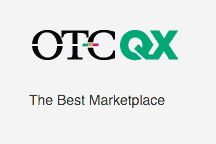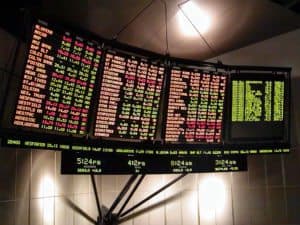
The advent of new securities exemptions has created opportunity for various sectors of finance. Beyond the fact that issuing companies now have new alternatives for raising capital, and a broader group of investors may gain access to early stage companies, there is a question of liquidity. So what do you do once you own shares in a smaller company? For many, it is a “wait-and-see” situation, but for some issuers it may make sense to trade their shares on a public marketplace. Creating liquidity for investors is, obviously, an ultimate goal.
 Under reconstituted Regulation A, as updated under the JOBS Act of 2012 (now commonly referred to as Reg A+), an issuer may raise up to $50 million – all online from both accredited and non-accredited investors. After they have raised money by selling securities they may choose to list their shares on an “alternative trading system” (ATS) or an exchange. OTC Markets has promoted its platform, an ATS, as the marketplace of choice. In fact, OTC Markets listed the very first issuer, Elio Motors, to make the leap from crowdfunding under Reg A+ to publicly trading their shares. More companies will soon follow. But other marketplaces see growth opportunity too. This is especially important in an environment where IPOs have been in perpetual decline. Fostering an ecosystem where smaller companies may trade their shares is key to revitalizing the moribund IPO market. Reg A+ may end up being the catalyst to pull public offerings up from their slump.
Under reconstituted Regulation A, as updated under the JOBS Act of 2012 (now commonly referred to as Reg A+), an issuer may raise up to $50 million – all online from both accredited and non-accredited investors. After they have raised money by selling securities they may choose to list their shares on an “alternative trading system” (ATS) or an exchange. OTC Markets has promoted its platform, an ATS, as the marketplace of choice. In fact, OTC Markets listed the very first issuer, Elio Motors, to make the leap from crowdfunding under Reg A+ to publicly trading their shares. More companies will soon follow. But other marketplaces see growth opportunity too. This is especially important in an environment where IPOs have been in perpetual decline. Fostering an ecosystem where smaller companies may trade their shares is key to revitalizing the moribund IPO market. Reg A+ may end up being the catalyst to pull public offerings up from their slump.
Recently, Crowdfund Insider wrote about Reg A+ issuers considering a listing on NYSE or NASDAQ. In an interview, it was mentioned the cost was about the same to list on NYSE versus OTC Markets and there were no “Blue Sky” issues related to listing on a national exchange. OTC Markets reached out and said not so fast. We want to share our point of view.
We asked Jason Paltrowitz, Executive Vice President of OTC Markets, to explain how OTC Markets compares to NYSE MKT. He shared;
“I like to compare OTCQX with the NYSE MKT,” says Paltrowitz. “OTCQX, our Best Market, offers small companies almost all the benefits of the NYSE MKT- a liquid, secondary trading market, visibility, access to capital, a public market valuation and the ability for small companies to build their brand and reputation across the network – at nearly half the cost of an NYSE MKT listing.”
 Pointing to reporting requirements for issuers, Paltrowitz said all NASDAQ, NYSE and NYSE MKT companies must be SEC reporting companies – a costly, ongoing toll.
Pointing to reporting requirements for issuers, Paltrowitz said all NASDAQ, NYSE and NYSE MKT companies must be SEC reporting companies – a costly, ongoing toll.
“OTCQX has high financial standards, common sense corporate governance standards and the highest disclosure standards of all OTC markets. U.S. OTCQX companies, including Reg A+ companies, must file PCAOB-audited annual financials, as well as unaudited quarterly or interim financials and make timely disclosures of material news events to the public. However, unlike the NYSE MKT, OTCQX allows companies to leverage their existing reporting standards, including Reg A+ reporting, to qualify.”
Paltrowitz says that OTCQX companies cannot be penny stocks, shell companies or blank check companies. They also cannot be in bankruptcy or reorganization procedures.
“Another point of difference: unlike NASDAQ or the NYSE, OTCQX and the other OTC markets are dealer markets that connect a network of broker-dealers who compete directly with one another on price and execution quality. Studies have shown that smaller, less liquid securities thrive in dealer markets where broker-dealers are incented to provide liquidity to the market,” explains Paltrowitz. “Some have mentioned concerns about Blue Sky secondary trading restrictions around OTCQX securities. That is something we are working on. Currently, 16 states recognize OTCQX for Blue Sky manual exemptions (14 states recognize our OTCQB Venture Market) and we are adding more all the time. Also, Blue Sky for secondary trading is only related to broker solicitation. We are seeing a lot less broker-dealer solicitation in our markets as technology has empowered more self-directed investors.”
 Paltrowitz notes that issuers under Reg A+ may continue to use the exemption even after they list on OTCQX – or one of the other OTC markets. As it stands now, once you list on either NYSE or NASDAQ, Reg A+ is no longer an option.
Paltrowitz notes that issuers under Reg A+ may continue to use the exemption even after they list on OTCQX – or one of the other OTC markets. As it stands now, once you list on either NYSE or NASDAQ, Reg A+ is no longer an option.
“That should be an important consideration for small companies that are looking to take advantage of Reg A+ more than once,” adds Paltrowitz.
NYSE MKT has recently been making a push into Reg A+ by providing additional services like education & support for issuers – a potential differentiator for smaller companies with few resources. Asked if OTC Markets is providing the same?
“We have been providing support to Reg A+ issuers almost since the rule became effective in May 2015. In fact, OTC Markets Group was the first market operator to introduce an on ramp for Reg A+ securities to our markets in June 2015,” states Paltrowitz. “Since then, we have held countless calls with current and prospective Reg A+ issuers and attorneys and participated in numerous webinars in partnership with PR Newswire, law firms and other organizations to educate companies about the rules. In addition, we have held two educational events about Reg A+ and the JOBS Act for issuers and advisors at our offices in New York City and we are looking to hold more such events across the country this year. The Reg A+ resource page on our website provides a good compendium of useful Reg A+ information. Aside from issuers, we are also actively engaged in educating broker-dealers about this new security type.”
 And what about the cost? If a company decides to list on any exchange of marketplace there is a fee … a cost that is inevitably born by the owners.
And what about the cost? If a company decides to list on any exchange of marketplace there is a fee … a cost that is inevitably born by the owners.
“NYSE MKT listing fees start at $50,000 plus a $35,000 ongoing annual fee, but of course that doesn’t count the substantial additional annual legal, accounting and regulatory compliance costs associated with maintaining an exchange listing,” clarifies Paltrowitz. “A 2011 study by the IPO Task Force found it costs on average $2.5 million to go public on a stock exchange and $1.5 million in annual compliance costs to be an exchange-traded company. And that doesn’t take into account the value of management’s time, about one-third of which is spent meeting the requirements of being an exchange-listed company.”
If a company has raised only a few million dollars in a small offering the listing and annual fee can quickly add up for a smaller firm. For OTCQX (their best market) the fee to list is $5000 plus an annual $20,000 fee. This does not include ongoing legal and accounting fees but this number will be lower than for an exchange listed firm.
 OTC Markets has positioned its platform as the perfect marriage for smaller companies seeking liquidity for the US – somewhat similar to the Canadian TSX or the UK’s LSE AIM. So does the US need a dedicated venture exchange?
OTC Markets has positioned its platform as the perfect marriage for smaller companies seeking liquidity for the US – somewhat similar to the Canadian TSX or the UK’s LSE AIM. So does the US need a dedicated venture exchange?
“OTC Markets is the venture market,” claims Paltrowitz. “Although we also serve foreign companies, a majority of our issuers are small, developing companies. We are also a global leader in exchange graduates, graduating more companies each year to an exchange than the TSX Venture Exchange and London’s AIM market combined. Over the past five years, we have graduated almost 300 companies from our markets to an exchange.”
There has been some movement in Congress to create a dedicated venture exchange. OTC Markets is opposed to any legislative action that removes issuer choice and mitigates competition. Last year, OTC Markets forwarded a letter to the House Financial Services Committee advocating on behalf of the benefits their marketplace may offer to smaller companies. NASDAQ stated last year that a better approach would be to institute reforms for smaller companies.
Paltrowitz explained his perspective;
“We agree that a better approach to improving capital formation and trading for small companies would be to modernize existing securities laws for the Internet age. Taking a cue from the JOBS Act, we have proposed four simple ideas:”
- Allow current SEC reporting companies to raise capital under Regulation A+ Tier 2 so they can raise capital online across state lines.
- Grant margin eligibility to established companies trading OTC and on regional exchanges by bringing back the OTC Margin List previously published by the Federal Reserve under Regulation T.
- Improve disclosure, regulation, and enforcement of online paid stock promotion.
- Allow the SEC to study and make recommendations as to how public companies and investors can use online, data-driven and social tools to more efficiently and effectively raise capital, provide information and protect investors.

So how is OTC Markets Reg A+ pipeline shaping up? Is Wall Street aware of the smaller IPO opportunity?
“Our Reg A+ pipeline is looking good. We have several companies that are in various stages of their offerings and we’re hopeful they’ll close and begin trading soon. We have also had a couple community banks on our markets that have successfully raised capital under Reg A+ Tier 1 for the purposes of an acquisition and for other reasons. So, it’s not only private companies that are using this. Wall Street has been slow to recognize the opportunity in Reg A+ and companies and investors are still sorting it out, but we expect the landscape will change a lot within the next few years.”
Paltrowitz believes that Reg A+ will help reinvigorate the small IPO market but this will take some time. Companies, bankers, attorneys and other support services are only now becoming aware of the capital-raising option.
“I don’t think this will be a typical VC play. In fact, the companies that take advantage of Reg A+ are the types of companies that are often overlooked by VCs – small biotech companies whose path-to-market is longer than the typical VC holding period, real estate investment companies, community banks and entrepreneurial companies like Elio Motors that seek to disrupt an entrenched industry like automotive,” says Paltrowitz.
 He also believes that while being an improvement, Reg A+ is not perfect.
He also believes that while being an improvement, Reg A+ is not perfect.
“One thing that can be done to improve Reg A+ is to expand it to include smaller SEC reporting companies.”
Paltrowitz says there are thousands of fully SEC reporting companies – those that meet the high disclosure and reporting standards set forth by the SEC and the federal securities laws – that could benefit from Reg A+ but have been (unfortunately) excluded from using the exemption.
OTC Markets has, in fact, filed a petition to expand the exemption and broaden its impact. They remain hopeful that the new administration will consider their pitch. Either way, OTC Markets is bullish on the future of their various marketplaces and the potential of smaller IPOs.

